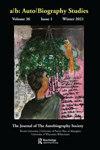Flawed Border Crossings in Life Writing by Fabienne Kanor and Gisèle Pineau
Q1 Arts and Humanities
引用次数: 0
Abstract
Abstract In this essay, the authors compares two works of life writing by two French-language writers of Caribbean origin: Gisèle Pineau and Fabienne Kanor. Both writers represent contemporary border crossings in their work and, importantly, contextualize these border crossings in terms of the history of the Caribbean and the legacy of slavery. Their texts are read through the lens of Michael Sheringham’s notion of the “autobiographical turning point”—an event in life writing that defines the life and the life writer, that changes the direction of the narrative, and that performs the acts of remembering and forgetting. The authors argue that these writers’ texts present border crossings as turning points in their narratives that are flawed or failures, and that these major events became spiraling rather than turning points.作者:法比安·卡纳和吉斯丽·皮诺
摘要本文比较了加勒比裔法语作家吉斯蒂勒·皮诺和法比安娜·卡纳的两篇生活写作作品。两位作家都在他们的作品中表现了当代的越境行为,更重要的是,他们将这些越境行为置于加勒比海历史和奴隶制遗产的背景中。他们的文本是通过迈克尔·谢林汉姆的“自传体转折点”的概念来解读的——一个生活写作中的事件,它定义了生活和生活作者,改变了叙事的方向,并表现了记忆和遗忘的行为。两位作者认为,这些作家的文本将边境过境视为他们叙事中的转折点,这些转折点是有缺陷的或失败的,这些重大事件是螺旋式上升的,而不是转折点。
本文章由计算机程序翻译,如有差异,请以英文原文为准。
求助全文
约1分钟内获得全文
求助全文
来源期刊

a/b: Auto/Biography Studies
Arts and Humanities-Literature and Literary Theory
CiteScore
0.80
自引率
0.00%
发文量
27
期刊介绍:
a /b: Auto/Biography Studies enjoys an international reputation for publishing the highest level of peer-reviewed scholarship in the fields of autobiography, biography, life narrative, and identity studies. a/b draws from a diverse community of global scholars to publish essays that further the scholarly discourse on historic and contemporary auto/biographical narratives. For over thirty years, the journal has pushed ongoing conversations in the field in new directions and charted an innovative path into interdisciplinary and multimodal narrative analysis. The journal accepts submissions of scholarly essays, review essays, and book reviews of critical and theoretical texts as well as proposals for special issues and essay clusters. Submissions are subject to initial appraisal by the editors, and, if found suitable for further consideration, to independent, anonymous peer review.
 求助内容:
求助内容: 应助结果提醒方式:
应助结果提醒方式:


